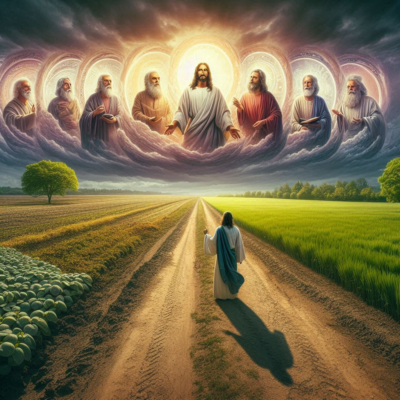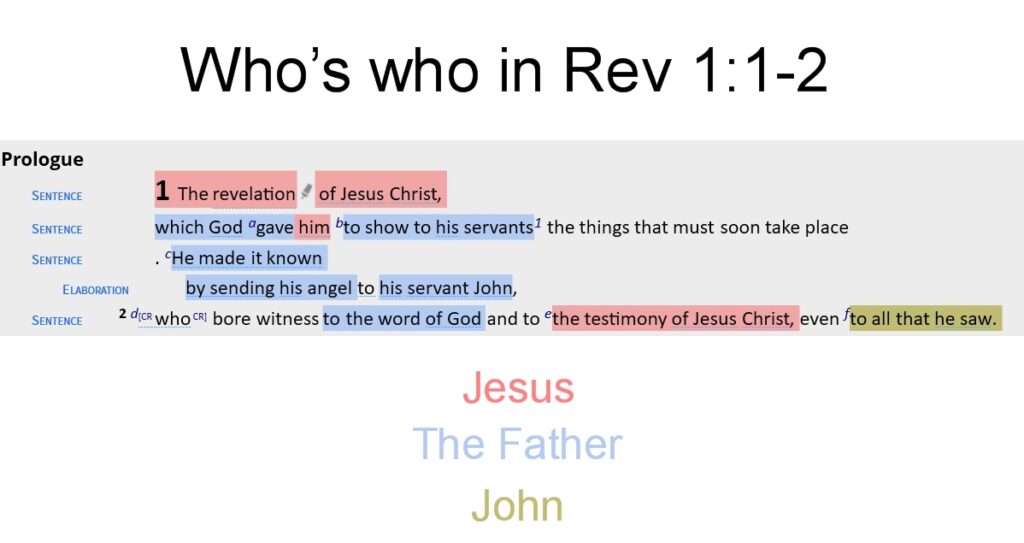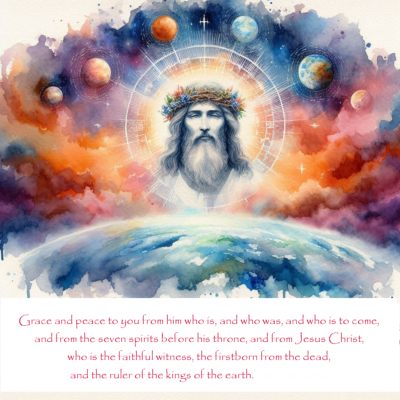Revelation is such a dramatic book. An apocalyptic vision. The last days of the earth. But there’s so much to understand before “viewing” that revelation. Today, we have movies. Maybe previews or social media videos to get us to watch it. But not 2,000 years ago! Revelation was delivered on scrolls. To the seven churches of Asia.

Did you just think, “How boring”?
Not at all. We have minds. And we can imagine.
Even AI, in a sense, can imagine. I asked one, MS Copilot” to make an image representing something written on the first scroll of Revelation:
Can you make a surrealistic image for me representing Jesus giving greetings to seven different churches from Biblical times along a dirt path to represent Rev 1:4 where John gives greetings from God and Jesus to the 7 churches in Asia?
The adjacent image is what it returned. Not what I was expecting. I thought I’d get 8 little churches, with Jesus walking along a path.
But look what I got. An image of Jesus walking along a dirt path. But in this image, Jesus is imagining, playing the scroll forward, to who He’s going to see along the path. Yes, Jesus imagines Himself in the clouds – a Heavenly scene. And with Him are (maybe) the 7 angels of the churches.
We haven’t gotten to them, yet, But we’ll see there is an angel associated with each church. We’ll also see that scholars can’t agree whether the “angel” of each church is an actual angel, a leader of that church, or something else.
For that reason, I really liked the image it gave me. It’s a reminder, don’t put this Revelation in a box. Don’t think you know what it means already, because even experts who make a life study of this, they don’t agree. Why not? Because they don’t know for sure either.
As for me? This is my third time writing something on Revelation. It’s already so much different from what I wrote before. That’s called growth. I’m sure, if I’m blessed enough to be able to write about it again in another 10-15 years, it’ll be different again.
So, as we go through this, don’t put God in a box. Don’t put Jesus in a box. And, oh yeah, don’t lock up your mind in a box either! Ask the Holy Spirit to open you up to what God has for you, at this time, from this incredible book.
In an effort to try to keep the topic of Revelation from getting much too long, I’m going to make use of AI resources recently added to LOGOS, which is where most of my digital library is contained, along with all the software resources that come with the package. To that end, I have a new font color to identify the LOGOS AI results from those of other AI engines, such as Claude, Copilot, and others. LOGOS AI text. Other AI text. I’ll be using LOGOS AI to take a number of different resources and have it summarize them, being sure the end result maintains the intent of the various authors included.
Summary
The Seven Churches in Revelation: The Book of Revelation begins with letters to seven churches in Asia Minor, which were both literal congregations and symbolic representations of broader Christian teachings.
Interpretation and Symbolism: The number seven in biblical numerology represents completeness. Scholars debate whether these churches represent different historical periods, spiritual states, or simply serve as warnings and encouragement for all believers.
Different Views on Revelation: People interpret Revelation in various ways—some see it as a thrilling story, some as a reason to fear or reject God, while others find inspiration and love in its messages.
The Role of Christians: The Great Commission calls believers to share the message of Christ, even considering how they can leave guidance for those who might be “left behind” after pivotal events like the rapture.
Personal Reflection and Growth: Understanding Revelation involves openness to continual growth and interpretation, rather than rigid assumptions. Readers are encouraged to seek wisdom from the Holy Spirit and embrace an evolving spiritual journey.
Revelation is a powerful and complex book that invites readers to approach it with openness and a willingness to grow in understanding. The messages to the seven churches serve as both historical accounts and spiritual lessons, encouraging believers to reflect on their faith and their relationship with God. Rather than viewing Revelation as a fixed prophecy, the discussion underscores the importance of seeking wisdom and guidance from the Holy Spirit while remaining open to evolving interpretations. As readers engage with this profound text, they are encouraged to embrace its teachings with humility and a desire for deeper connection with God.
Revelation – greetings to the seven churches
Before we get into the details, let’s read through the short passage – Greetings and Doxology
Greetings and Doxology
Rev 1:4 John,
To the seven churches in the province of Asia:
Grace and peace to you from him who is, and who was, and who is to come, and from the seven spirits before his throne, 5 and from Jesus Christ, who is the faithful witness, the firstborn from the dead, and the ruler of the kings of the earth.
To him who loves us and has freed us from our sins by his blood, 6 and has made us to be a kingdom and priests to serve his God and Father—to him be glory and power for ever and ever! Amen.
Rev 1:7 Look, he is coming with the clouds,
and every eye will see him,
even those who pierced him;
and all the peoples of the earth will mourn because of him.
So shall it be! Amen.
Rev 1:8 “I am the Alpha and the Omega,” says the Lord God, “who is, and who was, and who is to come, the Almighty.”
John
The Greeting begins with John giving his name. Not because he was the true author of the book. It wasn’t even a book back then. Most likely, it was written on a scroll.
But then. John wasn’t the true author of the scroll either. As we already saw in part 1 of the series, What is the book of Revelation in the Bible? –

John was the recipient of the revelation from God. If you haven’t read the first part of the series yet, I encourage you to check it out. Among other things, it goes through the structure of the sentence above and shows how God the Father, Jesus the Son, John the recipient of the revelation, and even us – how we fit into everything in the book of Revelation.
You may read the entire post or continue one section at a time.
To the seven churches in the province of Asia:
There are various thoughts among scholars about the significance of the seven churches is Asia. The simplest is that they acted as a sort of postal service for the area. Given the significance of the number seven and the use of seven churches as a message to believers, that appears to be an oversimplification.
The seven churches mentioned in the Book of Revelation hold significant symbolic and literal meaning. These churches, located in Asia Minor (modern-day Turkey), were real congregations facing various challenges in the first century[1][2]. However, the number seven also carries symbolic weight, representing completeness and perfection in biblical numerology[3][4]. Some scholars interpret these seven churches as representative of the entire Christian church throughout history[2][4]. The letters to these churches contain warnings, encouragements, and promises from Christ, addressing issues such as false teaching, persecution, and spiritual lukewarmness[2]. While some interpret these letters as prophecies of seven epochs in church history, this view is not supported by the text itself[2]. Instead, the letters were intended to have immediate relevance for their first-century recipients, while also providing timeless spiritual lessons for Christians in all eras[2][3]. The symbolic nature of the seven churches is further emphasized by the repeated admonition to “hear what the Spirit says to the churches,” suggesting a broader application beyond the specific congregations addressed[4].
[1] Utley, R. J. (2001). Hope in Hard Times – The Final Curtain: Revelation: Vol. Volume 12 (p. 19). Bible Lessons International.
[2] Sloan, R. B. (1998). The Revelation. In D. S. Dockery (Ed.), Holman concise Bible commentary (p. 667). Broadman & Holman Publishers.
[3] Gregg, S. (1997). Revelation, four views: a parallel commentary (p. 51). T. Nelson Publishers.
[4] Seiss, J. A. (1901). The Apocalypse: A Series of Special Lectures on the Revelation of Jesus Christ with Revised Text (Eighth Edition, Vol. 1, p. 137). Charles C. Cook.
Why do we care about these seven churches?
There’s a lot to gain by learning about the seven churches in Revelation. I have a very detailed/in-depth study in a series titled Seven Letters to Seven Churches. We aren’t going to go into that much detail here. That series gets into the culture, the physical environment, political and social issues, and so on. Each of them was tied to the messages from Jesus. Further, they examined how those issues relate to us today. By all means, check it out if you want more.
But this series, Revelation without the weeds, focuses primarily on the relationship between us and Jesus. That relation, if it exists at all, can range from nothing to very deep. In addition, the first series was only about the seven letters. This one, God permitting, will cover Revelation from beginning to end. Plus, it’s not only about any one of us as an individual, but also gets into the interactions between believers and non-believers – both before and after the event known as the rapture.
So, why do we care? Or maybe it’s more like why should we care?
We should care because Revelation can easily mean three different things to three different people. Plus, not so easily, but it also means a fourth thing to some people.
Revelation can be a nice scary story.
There have been all sorts of books and movies about the end of the world. The Apocalypse. Good versus evil. All that stuff.
There are many people who don’t know about God, or deny God to the point where they’ve convinced themselves that He really doesn’t exist. They’ll read this and maybe think it’s really “awesome”. A great page-turner. They probably even enjoy the good versus evil theme. But they’ll also have trouble with God and Heaven. Maybe substitute something else in their minds when they read it. Like their favorite cartoon superhero. Anything but God.
Revelation can be a reason to hate God
The second way to view revelation is to use it as a reason to hate God. Or to turn away from Him. Not want to believe in Him. All sorts of negative emotions.
Why? How do people come to this conclusion? Because they don’t really “know” God. They know things about Him. But they don’t understand, for various reasons ranging from never having tried to learn to learning from the wrong people / churches / politicians / podcasts / websites.
They think/believe God is evil.
I wrote something back in 2011 that asked, is God loving or angry? That is, if it’s heart, the question we all need to answer. If we read the Bible and reach the conclusion that God’s angry, it’s hard, if not impossible, to even want to believe in Him. But really, the idea that God is angry misses a very key point. God is loving. And He gives us the choice to love Him back – or not. What we fail to see, hear, grasp, understand, is that when we choose to not love God, He gives us exactly what we asked for. A life without Him. Without any of the good things He created. All we have is a life with no love. Forever. Until we die here on earth and then for eternity after that. A life without God.
Revelation can be a reason to love God.
Which brings us to the third way to read Revelation.
If you read the first series on the Seven Letter to the Seven Churches, then you realized/learned something. Something we’ll also get into here. For every message to those who refuse to believe in Jesus, who learn something about how they got where they are and something about where their current path will take them, there’s something else. Every such message also comes with a way to get off the current path, to overcome the evil, change their beliefs and their hearts, and spend eternity with God.
Let’s face it – an angry God who was out to get everyone for every little thing they did wouldn’t be giving them a way to avoid their “destiny”.
Revelation is even more than a reason to love God.
So those are the most obvious ways to read Revelation. But there’s something else. Something we maybe don’t notice. And something that’s hard enough to do now, before The End, let alone once all this begins. And yet, it’s there.
Jesus told His original disciples, and therefore His currently living disciples – those who truly are Christians/followers of Jesus, the following:
The Great Commission
Mt 28:16 Then the eleven disciples went to Galilee, to the mountain where Jesus had told them to go. 17 When they saw him, they worshiped him; but some doubted. 18 Then Jesus came to them and said, “All authority in heaven and on earth has been given to me. 19 Therefore go and make disciples of all nations, baptizing them in the name of the Father and of the Son and of the Holy Spirit, 20 and teaching them to obey everything I have commanded you. And surely I am with you always, to the very end of the age.”
Yes, we’re supposed to convince people to get baptized. But really, we can only plant seeds, be examples, teach, but the actual process of deciding to be baptized must be between each person and God. If someone only gets baptized because they like us and what we said, but don’t make any attempt to know or follow Jesus, are they truly Christian?
But here’s the thing. After the rapture, there won’t be any of those “true followers of Jesus” left on the earth. None.
This begs a question. Who’s going to help anyone who realizes what happened and is now interested in truly giving themselves to Jesus and following Him? Have we, the ones who are presumably/hopefully taken up in the rapture, done anything to help those who are left after we’re gone?
Have we spoken enough with people about what we believe that they might have a clue as to why we’re gone? Have we lived a life that might make them wish to change their direction after we’re gone?
Remember, after the rapture, everyone who really did follow Jesus will be gone. If that’s us, have we left enough of an impression on people that they’ll believe our life was one worth emulating, important enough that the dangers that will come with it after all the true Christians are gone?
Whether we do it or not, most of us at least know we should be trying to perform the Great Commission for people in our lives. But how many of us think about the possibility that The End will come before we die? That the chance to talk with someone we love very much might be gone? That maybe the best we can do, the only thing we can do, is leave something behind for someone we love dearly, but won’t see anymore because we’ll be “taken home”?
That’s the fourth way of viewing Revelation. There’s a famous book series, Left Behind. But what are we doing for those who may be left behind at the very moment Jesus returns for us?
Why do we care about these seven churches?
If you’re still wondering why we should care about the Seven Churches, I’m not sure there’s much else I can say. I can only pray for you.
But maybe, just maybe, if you keep reading, you’ll reach out to God and ask Him for help. Understanding. Love.
The seven churches are us
We’ve already gone through the details, but let me summarize what’s going on with the seven churches.
Regardless of the various reasons why these seven churches were the ones chosen to receive the letters, there’s something we need to realize. The choice may have been simple geography and the “postal route” of the time. It may have been the makeup of each church. But then, no church was made up of only the one type of person described in the letter to that church. So it’s not like any of them was a one-size-fits-all letter for everyone in that church.
Plus, each church was told to read every letter. No doubt, because each church had people whose conditions matched better with another church than with the one they were part of. So, the only way to have everyone “hear “listen to” the message, whether they “heard” it and followed it or not, was to have everyone listen to every letter.

On top of that, people are complex. Multi-layered. Let’s say we resolved the issue described in one church. There’s going to be another issue that shows up after that, probably from a different church’s message. And so on. Remember, we won’t be perfect this side of Heaven.
Therefore, we have to get beyond thinking that we need to figure out which church we’re part of. Which churches’ message is for us?
Why? Because they’re all for all of us. The thing is, which one is the Holy Spirit going to prompt us to work on first? And then, which one second, and so on.
Not surprisingly, there’s an answer to this question contained within the Bible. Actually, it’s there in multiple places. But one I like to refer to is the one below:
Psalm 139
For the director of music. Of David. A psalm.
Ps 139:1 O LORD, you have searched me
and you know me.
Ps 139:2 You know when I sit and when I rise;
you perceive my thoughts from afar.
Ps 139:3 You discern my going out and my lying down;
you are familiar with all my ways.
Ps 139:4 Before a word is on my tongue
you know it completely, O LORD.
…
Ps 139:23 Search me, O God, and know my heart;
test me and know my anxious thoughts.
Ps 139:24 See if there is any offensive way in me,
and lead me in the way everlasting.
You can check out the inset box for a deeper look into the extracted portions of Pslam 139. Some people are afraid to be examined by God. But really, if our goal truly is to spend eternity with God because we think that’s the best possible future (and present) then we should want His examination. And His feedback.
Honestly, it’s something we should try to remember to pray every day. And then also wait for an answer. And finally, try to act on His response.
So, it’s also how we should read the Bible. Ask God, via the Holy Spirit, for not only understanding of the passages we read, but how those passages relate to us. It’s not like it’s an OSFA – One Size Fits All – where it always means the same thing to everyone, all the time. After all, God’s goal isn’t to create a bunch of robots. It’s to have us be the best person He made us to be. Not the best robot we could be.
Discover more from God versus religion
Subscribe to get the latest posts sent to your email.


